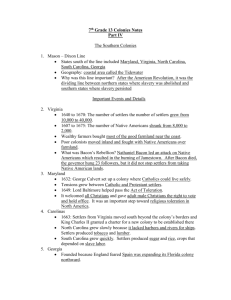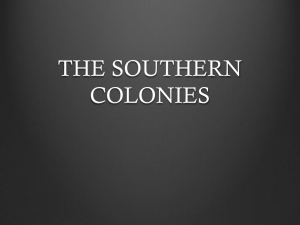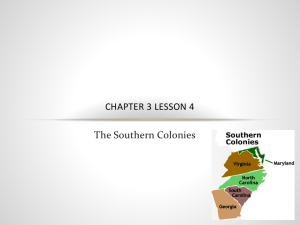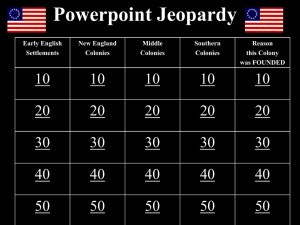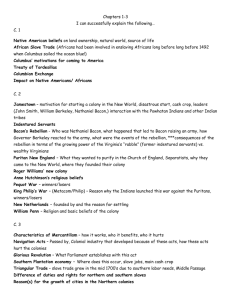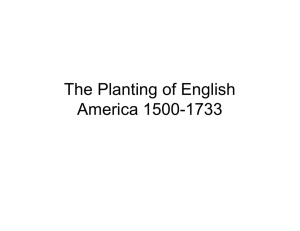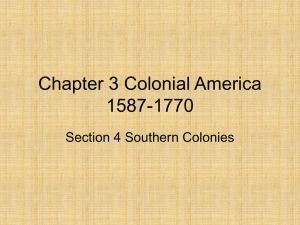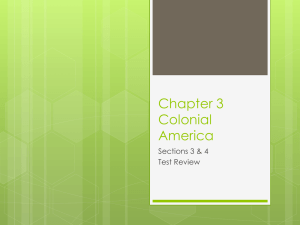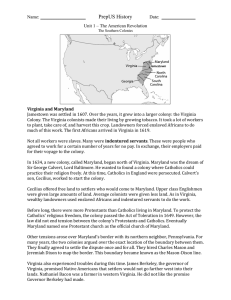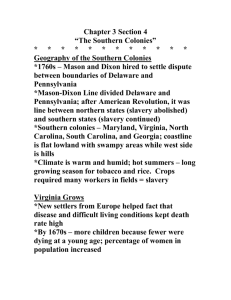The Southern Colonies
advertisement
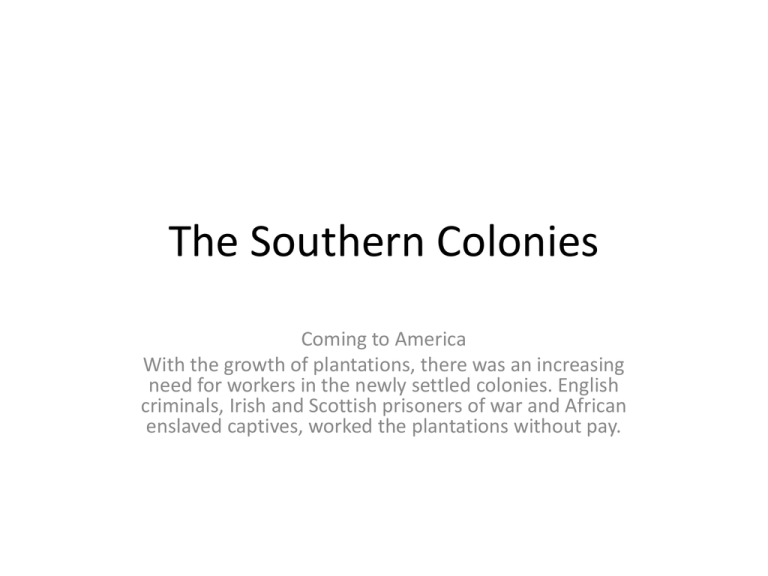
The Southern Colonies Coming to America With the growth of plantations, there was an increasing need for workers in the newly settled colonies. English criminals, Irish and Scottish prisoners of war and African enslaved captives, worked the plantations without pay. Maryland Established as a safe place for Catholics Maryland law declared that every person planting tobacco must also plant two acres of corn Baltimore, founded in 1729, was Maryland’s port and became the colony’s largest settlement Mason Dixon Line was the boundary between Maryland and Pennsylvania Baltimore passed a law called the Act of Toleration in 1649. the act granted Protestants and Catholics the right to worship freely. Virginia Expands Bacon’s Rebellion Nathaniel Bacon, a wealthy young planter was a leader in the western part of Virginia. Opposed colonial government because it was dominated by easterners. His rebellion showed that settlers were not willing to be restricted 1676 Bacon led angry westerners in attacks on Native American villages and set fire to the capital and drove the Governor into exile Governor declares Bacon “the greatest rebel that ever was in Virginia” Bacon’s sudden illness and death kept him from taking charge of Virginia Northern and Southern Carolina Northern part of Carolina settled mostly by farmers from Virginia Southern part of Carolina settlements spread • Grew tobacco • Sold forest products such as timber & tar • Fertile farmland, good harbors • Trade in deerskin, lumber, beef. Rice becomes colony’s leading crop. Economics & Slave labor in the Carolinas • In the 1740’s Eliza Lucas developed an important Carolina crop- Indigo. • Indigo, a blue flowering plant, was used to dye textiles. Known as the “blue gold” of Carolina. • Enslaved Africans who arrived in the Carolinas worked the rice fields. • Growing rice required much labor, so the demand for slaves increased. • By 1708 more than half the people living in southern Carolina were enslaved Africans. • Settlers wanted a greater role in the colony’s government, in 1729 Carolina became 2 colonies- North and South Carolina. Georgia The colony protected the other British colonies from Spanish Florida Savannah, a town built for the hardworking, independent and Protestant. Size of the farms was small, banned slavery, Catholics and rum. Founded in 1733, the last of the British colonies in America to be established Georgia soon had a higher percentage of nonBritish settlers than any other British colony in the Americas. Colonist’s demands and the colony’s slow growth led to larger landholdings and a lift on the bans of slavery and rum. The British were not the only Europeans who were colonizing America 1663 New France became a royal colony Territory was called Louisiana in honor of King Louis XIV. 1718 French governor founded the port of New Orleans. French settlement in North America advanced very slowly. French colonies grew so slowly that Native Americans were not pushed off their lands. The French had better relations with the Native Americans than other European settlers. They lived among the people, learned their language and respected their ways. • New Spain – Early 1700’s Spain establishes military posts in Texas – Spanish priests built missions along the Pacific coast. Enabling the Spanish to lay claim to California – Converted Native Americans to Christianity, forced them to serve as laborers in the fields and workshops. European conflicts in North America When the 2 countries were at war in Europe, fighting often broke out between British and French colonists France and Britain were principal rivals of the colonial period. Both nations were expanding their settlements in North America Britain and France fought several wars in the 1700’s In the late 1700s & early 1800’s, wars in Europe between the British and the French would shape events in the colonies even more decisively. Chapter 3 Section4 Vocabulary • Indentured servant- laborer who agrees to work without pay for a certain period of time in exchange for passage to America. • Constitution- a formal plan of government • Debtor- person or country that owes money. • Tenant farmer- farmer who works land owned by another and pays rent either in cash or crops • Mission- a religious settlement.

